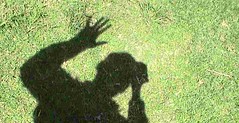Aquí la página de James Lovelock
Del 1er capítulo a The Vanishing Face of Gaia - A Final Warning, Basic Books, 2009:
"Icons are important to us: the cross, the scimitar, and the
hammer-and-sickle have dominated lives and history for
two millennia. For some the icon with greatest meaning is
that blue-and-white vision of the Earth first seen from
space by astronauts. That icon is undergoing subtle
changes as the white ice fades away, the green of forest and
grassland fades into the dun of desert, and the oceans lose
their blue-green hue and turn a purer, swimming-pool blue
as they, too, become desert. This is why at ninety years old
I will try to emulate the astronauts and fly into space to see
the Earth from above, before it vanishes. I want to catch a
glimpse of the Earth I have lived with all my life, even
though my most trusted physician, Douglas Chamberlain,
has advised me that the risk will be too great. I will go, despite
the warnings, to recapture that enthralling eureka
moment forty-four years ago when I was working at what
was then the center of space research, the Jet Propulsion
Laboratory (JPL) in California, and saw with my mind’s
eye our planet as something possibly unique in the universe,
something alive. Since then I have thought of the
word Earth as inadequate to describe the living planet that
we inhabit and are a part of. I am grateful to the author
William Golding for his suggestion that the name Gaia was
more appropriate. Not least among the joys of seeing our
live planet from high above will be the simple pleasure of
seeing with my own eyes how spherical it is. I had few
doubts that this was so, but as with many things in life as
well as in science, we have to take for granted that it is
round, even though when on the ground, our eyes tell us it
is flat.
Imagine my delighted amazement on hearing that my
wish to see the Earth from space would soon be fulfilled,
and I would see from the sky above New Mexico our
sphere of a world in all its glory. In an act of splendid generosity,
Sir Richard Branson made the gift and had already
founded his own space line, Virgin Galactic, to make it
possible. His ultimate upgrade, the flight to space, will let
me escape for a few brief minutes the all-pervasive introspection
of twenty-first-century life and allow me to share
that transcendental feeling of astronauts that our home is
not the house or the street or the nation where we live, but
the Earth itself.
Is there any need to see Gaia, the only living planet in
the solar system? After all, despite the recent economic set-"
back, life continues to get better in most of the world; even
the poor in the developed world, although malnourished,
are sometimes well enough fed to be obese. There are so
many possibilities of entertainment that there is no reason
to be bored day or night. Perhaps we no longer need to see
the Earth in reality when we can see it so well on Google.
It does matter, and it matters more than any other thing:
we have to see it as it really is because our lives are wholly
dependent upon the living Earth. We could not survive for
an instant on a dead planet like Mars, and we need to understand
the differences. If we fail to take our planet seriously,
we will be like children who take their homes for
granted and never doubt that breakfast starts the day; we
will not notice as we enjoy our daily lives that the cost of
our neglect could soon cause the greatest tragedy in the
memory of humankind. The Earth, in its but not our interests,
may be forced to move to a hot epoch, one where it
can survive, although in a diminished and less habitable
state. If, as is likely, this happens, we will have been the
cause."
martes, abril 27, 2010
A propósito del "día de la tierra" el pasado jueves 22 de abril
Publicadas por
Rlpr
a las
7:00 a. m.
![]()
Etiquetas: Estrategia
Suscribirse a:
Comentarios de la entrada (Atom)




No hay comentarios.:
Publicar un comentario